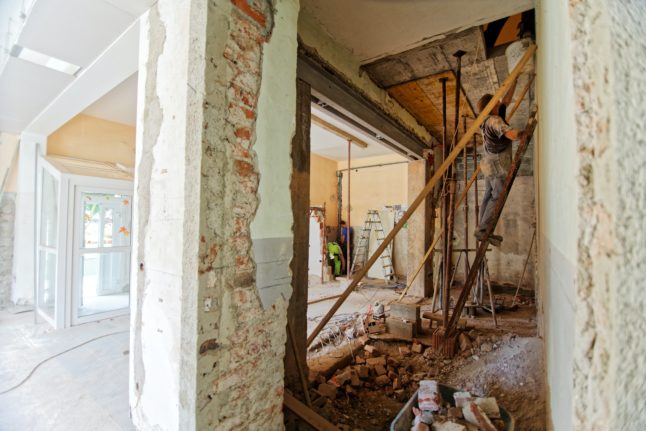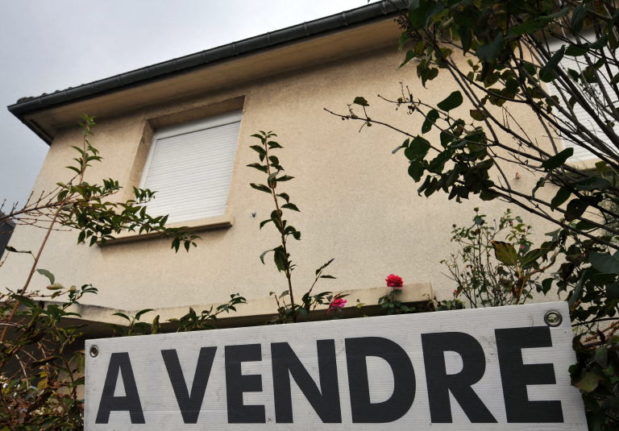Renovating a property in France is not for the faint-hearted, and it’s all-too easy to get bogged down in frustrating bureaucracy.
But if you get it right, it’s a great way to get a bargain property and adapt it to your needs and tastes.
We spoke to readers who had successfully renovated a French property, and if you’re in the middle of a project, you might find their responses quite cheering
“We made mistakes about the paperwork attached to renovating in France and rules and regulations are quite onerous especially if your French isn’t fluent,” said Peter McNulty.
The family lived for two years in a caravan, after buying two old stone barns near Cahuzac-sur-Vère, Tarn, 18 years ago. Overall, they spent 10 years transforming the buildings into two small houses for a total cost of €90,000 – including the cost of a small swimming pool.
But, he said: “It was a lot of fun doing it and we would certainly recommend it to anyone who is not afraid of hard work and is prepared to try anything. It is not rocket science!”
READ ALSO The ‘cheap’ way to get a second-home in France
Mick Tranter agreed – even after what he described as “18 years of continual (incredibly) hard work so far and we are not finished yet” on their “old, huge stone building” in Dordogne.
He said: “We have lived a life we could never have imagined and learned a huge variety of new skills but could never have anticipated the effort (both physical and emotional), costs and complications involved in what has been a daunting task.
“Renovation gives you an enormous sense of satisfaction and creates a home which suits your personal tastes.”
He added: “We would not have missed the experience for the world, but being 20 years older we would never attempt anything on the same scale again.
“Anybody thinking of renovating [needs] to be realistic about what they expect to achieve at the end of the project, whether it will still meet their needs and what they are able to invest physically and financially as both will far exceed your expectations.
“Most importantly, unlike the UK, you are unlikely to make any money from such a project in France even if you budget very carefully and do most of the work yourself.
“Basically – go for it, what can possibly go wrong?!”
READ ALSO ‘What I wish I’d known before I moved abroad’
Julia Frey, who describes herself as a “survivor” of four top-to-bottom property renovations in Paris, and who is about to embark on a fifth, warned: “If you don’t speak French or hire someone to be your intermediary, you’re as vulnerable as if you were senile.”
She advised: “Always get a licensed architect with 10 years insurance and both sign off on the contract. Buy extra personal maitre d’ouvrage insurance on your household insurance in case the remodel somehow endangers the building.”
US citizen Bruce Schluter agreed, having bought a property in Paris the day before the first lockdown, and trying to co-ordinate a refurbishment from the other side of the Atlantic: “A good architect is essential, especially if you are not expert in the French way of doing things!
“A renovation allows you to have things just the way you would like instead of having to live with someone else’s idea of how things should be.”
His property was finally ready shortly before France reopened its doors to travellers from the US.
“We are ecstatic with a the results,” he said.
READ ALSO EXPLAINED: Time-frame for buying and selling property in France
Banker Mike Gloyne and wife Louise have renovated properties in Haute-Savoie and the Dordogne while holding down full-time jobs. They would do it all again, despite administrative and personal issues.
“Everything takes longer and costs more,” he warned. “But we took a lot of personal pride in what we achieved – and also learnt new skills that I didn’t have before I started.
The couple turned accidental renovators when they found a doer-upper in a town near the Franco-Swiss border just over a decade ago. “We knew nothing about the French regulations and the rules we’d have to follow, so it was a bit of a scary proposition to begin with,” he said.
“From a budget and a time perspective, but we had some fairly significant issues. Dealing with the local mairie was painful. We had to go do a déclaration préalable, the paperwork we needed to do to make changes to the house. We didn’t need a building permit, as such, because we were only changing small aspects of the facade.
“It was a fairly straightforward process – but to get the mairie to approve it was extremely difficult. Even after we had followed what they wanted, to the letter, in terms of the colour of the tiles, the colour of the shutters, they then complained to us that, despite the fact they said to us we could paint the external walls white, the white we had used wasn’t the white they had in mind.”
READ ALSO Revealed: The ‘hidden’ extra costs when buying property in France
He said that, at one point, the police were called following a complaint the couple had employed English workers as opposed to local artisans to do the work. “The people we were using were from the UK, but they were registered in France,” he said. “It put a negative spin on the whole thing.”
A second builder sub-contracted work to another team, who took three times longer to do the work than had been planned, and who were often working on other projects elsewhere. To make matters worse, “The quality of work they did was substandard,” he said, explaining that another contractor brought in to fit the kitchen could not do his job because the walls weren’t straight, while shoddy plumbing work needed to be redone.
Surprisingly, despite these problems, it hasn’t put off the couple. Another project in southwest France – that first experience “had made us more determined,” Mike said – that they plan to run as a gite business was going much better. “It was a completely different experience, and we’ve loved it. It just goes to show it’s not the same everywhere.”
He concluded: “I think, overall, if you’re someone who has a passion for this sort of thing, you’ll get a lot out of it. It’s almost like a labour of love and if you think of it in those terms, then it makes sense. There’s something special about being able to leave your footprint on something in that way. But everything that we’ve been through to get there has been painful.”
Susan Sturman said that renovating a property in France only makes sense if you plan to stay there “in the long term”. She said they expect to stay at their apartment in the 18th arrondissement of Paris “for the rest of our lives”.
READ ALSO French property: How planning permission rules change in 2022



 Please whitelist us to continue reading.
Please whitelist us to continue reading.
Member comments